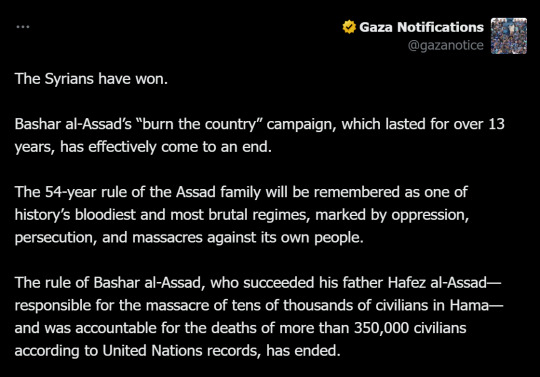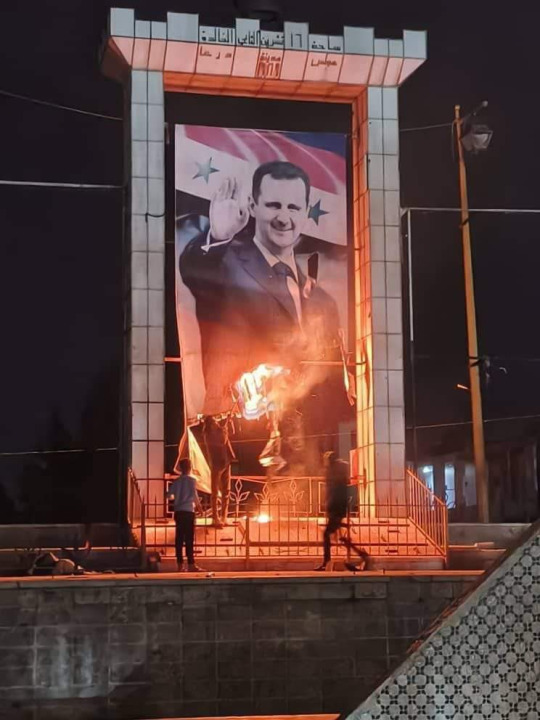#collapse of Assad regime
Explore tagged Tumblr posts
Text
HTS and the Fall of Assad's Regime
youtube
#Hay’at Tahrir al-Sham (HTS)#HTS#Organization for the Liberation of the Levant#Jabhat al-Nusra#Syria#Syrian conflict#al-Qaeda#Assad#Bashar al-Assad#Jolani#Abu Mohammad al-Jolani#Jabhat Fatah al-Sham#Salafi#jihadist#Idlib province#terrorism#Islamic governance#human rights#human rights violations#caliphate#Islamic rule#rebel offensive#Aleppo#Hama#Damascus#capture of Damascus#collapse of Assad regime#Syrian opposition groups#ISIS rivalry#Islamic rule in Syria
0 notes
Text
Vladimir Putin humiliated as Russian troops are forced to flee Syria
Russia has initiated a military evacuation involving a second airfieldKamyshlywhere an Il-76MD transport plane was spotted organizing various military hardware, from T-90 tanks to KAMAZ trucks for extraction. On a Syrian highway, a Russian soldier driving a pickup in a lengthy convoy of military vehicles was questioned about his destination, to which he simply said: “To Russia.” Specifically,…
#Assad regime collapse#Putin#Russia#russian soldiers retreat#Russian troops#Syria#Syria withdrawal#troops
0 notes
Text
The EU's executive branch, the European Commission, said that currently 'the conditions are not met for safe, voluntary, dignified returns to Syria.' Austria's government has said it is offering Syrian refugees in the country a 'return bonus' of €1,000 euros to go back to Syria following the collapse of Bashar al-Assad’s regime. The move comes as several countries across Europe have already begun deliberating what to do with their Syrian refugee populations. "Austria will support Syrians who wish to return to their home country with a return bonus of 1,000 euros. The country now needs its citizens in order to be rebuilt," Conservative Chancellor Karl Nehammer said in a statement posted in English and German on X. Nehammer said on the day al-Assad was ousted that the security situation in Syria would be reassessed to determine whether deportations could go ahead. Deporting people against their will is not possible until the situation in Syria has been deemed safe, so the government, led by the Austrian People’s Party (ÖVP) has said it will focus on voluntary deportations. Austria has also stopped processing asylum applications filed by Syrians, in line with several other European countries, including Belgium, Denmark, Germany and the Czech Republic. But all of those countries agree it is too early to consider returning refugees to Syria. The EU's executive branch, the European Commission, said that currently "the conditions are not met for safe, voluntary, dignified returns to Syria."
continue reading
0 notes
Text
Rebels Overthrow Assad in Syrian Civil War: A Turning Point
The Syrian civil war reached a critical milestone as rebels overthrew Assad's government. Key cities like Damascus, Hama, and Homs fell with little resistance, signaling a collapse in Assad’s military morale. #Syria #Assad #Rebels
The Syrian civil war reached a pivotal moment as rebels overthrow Assad and his government. They quickly captured key cities like Hama, Homs, and Damascus. The minimal resistance from Assad’s forces points to a major morale collapse within his troops. On X, one user posted, “Assad and his family have fled the country,” signaling the end of a regime that once held Syria under strict control. Why…
#Assad&039;s Downfall#Civil War in Syria#Middle Eastern Geopolitics#Rebels Overthrow Assad#Syria Fragmentation#Syrian Civil War#Syrian Future#Syrian Opposition#Syrian Rebels#Syrian Regime Collapse
0 notes
Text
THE ASSAD REGIME HAS COLLAPSED
LONG LIVE SYRIA
SYRIA IS FREE!!!! SYRIA IS FREE!!!!!
616 notes
·
View notes
Text
Assad's evil regime has finally collapsed completely!



319 notes
·
View notes
Text

News from the Front: The Reflections of a Russian Anarchist in Rojava
A Russian anarchist volunteer speaks on the collapse of the Assad regime, the future of Russia, and the looming threat of a Turkish-backed invasion of northeastern Syria.
http://crimethinc.com/Rojava2024
"I watched with special feeling as the Russian columns passed by me at one of the positions. I peered into the faces of the soldiers, trying to understand whether they realized that all these years, they had been terrorizing the population with bombings, they had surrendered Afrin to the Turkish army, they had kept Assad’s regime alive—and now all this is over. Russian military aid to the Syrian dictatorship has ended. I do not think that those soldiers realized that they were looking into the eyes of a man from the same country as themselves, but who chose the other side of the barricades."
140 notes
·
View notes
Text
The spectacularly rapid fall of Syria’s Bashar al-Assad and his regime is the Middle East’s 1989. Like the fall of the Berlin Wall, this weekend’s end of 54 years of Assad family rule signals an earthquake in the regional order—with tremors that will be felt for decades to come. Just as 1989 was marked by a series of falling dominoes in Poland, Hungary, East Germany, and elsewhere, the collapse of the Syrian regime is part of a chain of events, including Israel’s decimation of Hezbollah, Iran’s loss of its most potent proxy forces, and the weakening of Russia due to the war it started in Ukraine.
And just as 1989 marked the end of communism in Europe, Assad’s flight to Moscow signals the demise of the ideology of anti-Western, anti-Israel resistance in the Middle East. For more than half a century, the Assad family was the backbone for a political order in the Middle East in which a bloc of states styled themselves as the resistance to what they labeled Western imperialism and Zionism. The appropriation of the Israeli-Palestinian conflict proved to be a powerful tool to mobilize the masses across the region who wanted justice for Palestinians—sentiments that the Syrian regime and its allies instrumentalized to distract from their domestic failures, oppress their own people, and extend their regimes’ regional influence. In reality, these regimes cared little about the Palestinians.
Within this bloc, Syria and Iran believed they had entered a mutually beneficial and durable alliance—and each thought it had the upper hand. Syria was crucial for Iran because it was the heart of the land bridge between Iran and its most valuable proxy, Hezbollah in Lebanon, while Syria saw alignment with Iran as increasing its own stature against Israel and bolstering its influence over Lebanon.
For Iran, the ideology of resistance was an indispensable tool to rally support from Arabs and Sunnis as Tehran vied for dominance in the Middle East. As the leaders of a self-styled Axis of Resistance, the clerics in Tehran were able to supplant the old ideology of pan-Arab nationalism, as espoused by the Syrian Baath Party and others, and ultimately dominate several Arab countries through well-armed proxies. The Assad regime ignored this challenge even as Iran manipulated the Baath Party to serve Tehran’s own objective of achieving regional dominance. For example, Iran presented Hezbollah to Syria as an ally when Hezbollah’s primary purpose was to support exporting the Islamic revolution.
The Syrian uprising of 2011 and the war that followed shifted the balance of power toward Iran, which intervened to prop up the Assad regime. Most consequentially, Tehran summoned Hezbollah to support the Assad regime against the Syrian rebels.
In the course of the Syrian war, the country moved from being a partner to a client of Iran. A much-diminished Assad regime was now dependent for its survival on Iran and its proxies, including Hezbollah and Tehran-controlled militias from various countries. In other Middle Eastern states, including Iraq, Lebanon, and Yemen, Iran’s proxies consolidated their status as dominant political and military actors. Iran increased its investment in them as its outer lines of defense and tools of geopolitical influence.
Iran’s rise and dominance as a regional power came to define an entire era of Middle Eastern politics. Across the region, most countries either were under direct Iranian influence via the country’s proxies or were forced to configure their foreign policies around the threats posed by Iran. The Gulf Arab states, for example, ended up pursuing de-escalation with Iran to stave off the instability caused by its activities.
The United States, other Western countries, and Israel did not like this Iran-dominated order, but they tolerated it. They saw it as lower risk compared with the unknown forces that sudden political change in Iran or Syria could unleash. This Cold War-like arrangement with a confrontational status quo made Damascus and Tehran feel confident in their power vis-à-vis the West and its allies.
U.S. disengagement from the Middle East under the Obama administration paved the way for Russia to insert itself into the regional order. When Iran and its proxies showed themselves unable to prop up the Assad regime on their own, Moscow saw the Syrian war as a low-cost opportunity to reclaim its status as a global power and arbiter of the region. Russia’s substantial naval and air bases in Syria also served as critical logistical centers for Moscow’s expanding military operations in Africa.
For almost a decade, Russia thus became a major actor in the Middle Eastern cold war. Russia, Iran, and the rest of the Axis of Resistance appeared to form one bloc, while Western allies such as Israel and the Gulf Arab countries formed another. But Russian support for Assad was little more than a transactional partnership, and Russian-Iranian relations were never frictionless. From the beginning of Russia’s military intervention in Syria, it sought to undermine Iran’s influence in the country so that Russia remained the dominant actor.
The Iranian regime, in turn, was concerned about the challenge that Russia presented to its influence in Syria. Yet Tehran had no choice but to remain in Moscow’s orbit, regarding its influence over Syria as a small price to pay in return for gaining a powerful backer for its Axis of Resistance.
Tehran presented Hezbollah and the Assad regime to the Iranian people as a worthy investment: the front line of resistance to Israel and the crown jewels of Iran’s regional clout. Tehran needed to reassure Iranians that the economic sacrifices and political isolation that its support for Hezbollah and Assad generated were not in vain. Otherwise, Tehran argued, Iran would be under threat of erasure by Israel and the United States.
The collapse of the Assad regime has jolted this dynamic to an abrupt stop. Russia’s abandonment of Assad—and by extension, Iran’s project in Syria—creates additional rifts in Iran’s already shrinking network of proxies. The Iranian leadership will struggle to justify to its people decades of investment in Syria that have gone down the drain in a matter of days.
Standing alone without Syria and Russia in the face of a still-strong Western-backed bloc, the regime in Tehran will be revealed to its people as having imposed a futile sacrifice that not even its nuclear program can redeem. This poses a serious risk to the survival of the Islamic Republic—potentially the biggest fallout of last week’s events.
The repercussions of Assad’s collapse will also ripple across Lebanon, Iraq, and Yemen as Iran’s proxies find themselves without an important lifeline. In Lebanon, in particular, the political dynamics set off by Israel’s decimation of Hezbollah are likely to accelerate with the loss of the all-important land bridge for weapons supplies from Iran. The sudden vulnerability of an already weakened Iran also means that Tehran’s remaining proxies may doubt the reliability of their patron.
The domino effect of the collapse of the Assad regime will inevitably mean the end of the Iran-dominated regional order. Replacing it will be a regional order dominated by Israel and its partners. Israel has shifted its perspective from an uneasy tolerance of Iran’s influence in the Middle East to actively seeking an end to this status quo and has succeeded in practically neutralizing the biggest threat to its security, Iran. Israel will move from being a state surrounded by adversaries and clawing at regional legitimacy to becoming the Middle East’s agenda-setter. Enjoying good relations with both the United States and Russia also makes Israel a key player in ending the cold war in the Middle East.
For the Gulf Arab countries, Iran’s degradation as a destabilizing actor also bolsters the implementation of their economic visions. The defeat of Iran’s revolutionary project will pave the way for widening the scope of normalization between Arab countries and Israel on the basis of shared business, political, and security interests. This recalibration will likely push Turkey to act more pragmatically in the way it engages with the region.
The anti-Western ideology nurtured by the Syrian Baath Party for 54 years and successfully appropriated by Iran blossomed for decades but is rapidly withering. Just as the Cold War ended with the defeat of communism, decades of confrontation in the Middle East will end with the defeat of the resistance ideology.
79 notes
·
View notes
Note
I thought this was a blog about us presidents, no one comes here to read your thoughts on the mess in syria.
Well, first and foremost, this isn't a request line. I started this blog to write about whatever I want to write about and I've been doing that for 15+ years. It's not changing anytime soon. I don't care what you came here to read. It's not for you. If anybody finds anything interesting, it's an added bonus.
The collapse of a regime that has existed longer than I've been alive and has had an iron grip on one of the oldest continuous civilizations in the world is historic. And it's interesting to me, and I'll write about whatever interests me whenever I am interested by it. These moments should be fascinating to anybody who has an interest in history. You never know where the story is going to go from here, and that alone is interesting, as well. Just because it isn't "your" history doesn't mean it isn't historic.
When Bashar al-Assad succeeded his father in 2000, there was actually a significant amount of optimism around him. He was a London-educated ophthalmologist who was never intended to be Syria's leader but was thrust into the role after the death of his brother in a car accident. It was thought that he might be a reformer who would lead differently than the tyrannical rule of his father. There was hope that some real changes might take place in parts of the Arab world in 1999 and 2000 when King Hussein of Jordan, King Hassan II of Morocco, and Hafez al-Assad of Syria -- longtime rulers in their respective countries -- all died and were replaced by sons in their mid-30s (King Abdullah II in Jordan, King Mohammed VI in Morocco, and Bashar in Syria). Jordan and Morocco weren't in the same situation as Syria, especially considering the decades of close connections King Hussein and King Hassan II had with the United States, but there was still genuine hope about Bashar al-Assad in 2000.
Twenty-four years later, we know the path of history that Assad took, but these moments are hugely important -- not just for Syrians or Arabs or the Middle East in general, but for the entire world. What happens in Syria matters here. Don't forget that there are American soldiers on the ground in Syria. I'm from Sacramento and live in Los Angeles -- those two cities are almost twice as far apart as Damascus is from Jerusalem. Damascus is closer to Beirut than Sacramento is to San Francisco. Russia, Iran, Iraq, Turkey, Israel -- these countries are all intricately connected with Syria in various ways and have been for decades. If you aren't interested in what's going on in Syria today, that's your prerogative. If you don't think what's going on in Syria today makes a difference here, you are disturbingly ignorant.
#Syria#Bashar al-Assad#Assad Regime#Syrian History#History#Middle East#Arab History#Assad#Hafez al-Assad
98 notes
·
View notes
Text
I have a lot of questions about what the result of Assad’s regime collapsing will be but the only possible answer to any of them i think is “wait and see.” It is nice to see a real piece of shit get deposed, though.
93 notes
·
View notes
Text
youtube
🔴 ISRAEL RESPONDS TO COLLAPSE OF SYRIA'S SEPARATION AGREEMENT AMID REGIONAL INSTABILITY
🇮🇱 "This is a historic day for the Middle East," declared Prime Minister Benjamin Netanyahu, addressing the collapse of the Assad regime in Syria. He emphasized that this collapse, while offering opportunities, also poses significant dangers. Netanyahu linked this development to Israel's decisive actions against Hezbollah and Iran, Assad's primary supporters, which ignited a broader chain reaction among
COLLAPSE OF SYRIA
those seeking freedom from oppression.
The 1974 Separation of Forces Agreement between Israel and Syria, which had maintained stability for 50 years, has now collapsed. The Syrian army has abandoned its positions, creating a potential security vacuum. In response, the Israeli army has been instructed to take temporary defensive control of these positions to prevent hostile forces from gaining a foothold near Israel's borders.
Netanyahu extended a hand of peace to the Druze, Kurds, Christians, and Muslims in Syria who wish to coexist peacefully with Israel. However, he warned that Israel would not hesitate to take all necessary actions to protect its sovereignty and security.
Israel aims to monitor the evolving situation carefully. While seeking opportunities to establish peaceful relations with emerging forces in Syria, Netanyahu reaffirmed Israel's readiness to defend its borders decisively if needed.
Join ISRAEL REALTIME 🎗️"Connecting the World to Israel in Realtime"
33 notes
·
View notes
Text
Chaos
Sunday - December 8, 2024

Since December 1st: France and Germany have seen their governments collapse. South Korea implemented martial law. Georgia (the country) has seen protests and rebellion. Romania annulled the results of their 2024 presidential election. The Assad regime in Syria has collapsed.
There is definitely chaos in the world.
Trust that things are "falling" into place. And if there is something that is "falling" in your world right now, it's probably because its time is over and done.
Stay the course ... and make sure God Universe is pointing the way. Because this isn't over yet. By a long shot.
33 notes
·
View notes
Text
Why, exactly, did Washington back Sunni rebels taking down Assad, and if Washington wants a Turkish-backed Sunni Muslim caliphate in Syria, should we as Christians cheer Washington getting its way?
Leo Hohmann
Dec 09, 2024
All of those in the West celebrating the fall of the Assad regime in Syria had better be careful what they wish for.
I’ve heard some awful dumb statements coming from conservative circles in recent days about the “stunning” nine-day collapse of Syria.
One prominent regular guest commentator on Fox News has come out and said both sides in the Syrian Civil War are made up of really bad buys, but that he was hoping the coalition of “rebels” which include the former El Nusra, al-Qaida and other Sunni Muslim terrorists would win. Why? Because they’re against Russia and Iran, whom he fears more.
But even that nonsense pales in comparison to some of the other chatter out there in conservative and even Christian circles, where I’m hearing them say there is “hope” now for a democratically elected constitutional republic to emerge in Syria. Where is there another example of such a government, of, by and for the people anywhere in the Middle East right now? I would actually go further and say I don’t see a government anywhere on Earth right now that reflects those vaunted principles.
Let's face it: The U.S. didn't support the rebels who overran Syria because they thought Assad was too brutal of a dictator. They supported them because it was yet another way to deal a black eye to Russia.
Instead of Russia and Iran running the show in Syria, now we face the very real possibility that Russia and Iran will be replaced with Turkey and the Muslim Brotherhood.
14 notes
·
View notes
Text
BRO WTF THE ASSAD REGIME COLLAPSED
Lyk do ppl not realise how fucking huge this is?? Ik it was soo quick and unexpected but it's literally not even trending anywhere and nobody's talking about it lyk???
15 notes
·
View notes
Text
Do you realize how crazy it is that Assad's regime is completely collapsing before our eyes in less than a week after Iran and Russia gave up on it?!
This proves to the world what Syrians already knew, that the revolution was winning and on its way to total victory back in 2012 until Iran and Russia invaded and occupied most of Syria for over 13 years.
Fuck everyone who conspired to suffocate the revolution and silenced the will of the Syrian people. Your efforts were in vain! Die mad about it!
27 notes
·
View notes